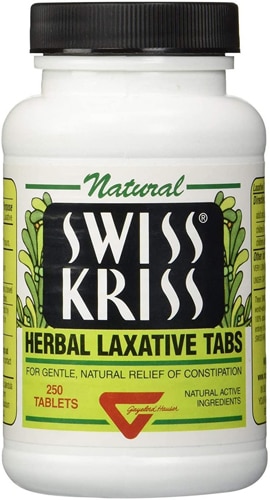Constipation, bloating, gas, diarrhea—even the names of classic tummy troubles can sound miserable.
And, quite often, they are. Whether they last for an hour or endure for a week, intestinal distress can lead to everything from pain and frustration to missed work and social rainchecks.
But continually reaching for an antacid—or continually calling in sick—does little more than put a Band-Aid on the issue (and, for some, their jobs and social lives at risk). While persistent problems should be discussed with your primary care physician or naturopathic doctor, temporary and infrequent bouts of tummy troubles can often be remedied with natural solutions. Here’s the top tummy troubles most of us face—and the natural fixes available:
1. Problem: Constipation
Impacting 20% of the U.S. population, constipation accounts for 8 million doctor visits per year. And with symptoms that include abdominal bloating and mild to severe discomfort, it’s no wonder: Being backed up can spoil an entire day, rendering us less inclined to exercise, socialize—even, at times, rise from bed. Traveling, alcohol, rich or unfamiliar foods, a chaotic schedule—all can contribute to constipation, especially if you toss in a handful of stress.
Solution: Relax, hydrate, exercise, and eat
Constipation can compound the stress you may be already experiencing, but it’s vital to encourage yourself to take a break. “Your bowels are all muscle, so in order to have a bowel movement, you need to be relaxed. Otherwise the bowels will stay clenched,” says author of Gutbliss and gastroenterologist Robynne Chutkan, MD. Some find that gentle yoga poses do the trick, while others encourage the process with a few drops of lavender oil in the toilet. What’s more, staying hydrated—with good, old-fashioned water—helps keep your GI tract functioning optimally.
Exercise beyond yoga can also aid in getting your bowels to behave, while a healthful diet that’s rich in vegetables, fruits, and soluble fiber (such as oat bran, lentils, nuts, and seeds) can take your tummy from obstructed to, well, free.
2. Problem: Flatulence
Flatulence may be a fact of life but that doesn’t mean it can’t lead to aches and pains of its own, as well as a smidgen—or a surge—of embarrassment. On average, people produce between a pint and a half-gallon of gas per day—a combination of oxygen, nitrogen, carbon dioxide, methane, and fermenting foods in the colon. While graver conditions may underline excessive gas, it’s usually due to the state of your digestive system. A dearth of water and exercise can also contribute to gas, while hormone changes—both menopause and PMS—can increase flatulence. (Indeed, women are more prone to gastrointestinal distress than men.)
Solution: Toss the gum, toss back a probiotic—and investigate your diet
Chewing a slice of Trident between meals may seem innocuous, but your GI tract may beg to differ. Oftentimes, swallowing excess air can lead to bloating and gas—whether that’s gas released from your mouth (belching) or your rectum. A smarter alternative may be to keep a small bottle of natural mouthwash on hand if you feel the need to “clean” your mouth after eating. Further, consider adding a probiotic to your diet. Known for their ability to increase “friendly” gut bacteria, they can contribute to smoother digestion (and less fireworks in the intestines).
And while it seems like a cruel trick of nature that some of the healthiest foods—from cauliflower and beans to lentils and broccoli—can also produce the most gas, the key to eating them sans a surplus of flatulence is to a) increase your intake of them every day so that they’re not a shock to the system, b) lightly steam your veggies, which may make them more digestible, and c) try to incorporate more gut-friendly veggies onto your plate, such as cucumbers, squash, carrots and celery.
3. Problem: Diarrhea
Commonly characterized as loose, watery stools—or bowel movements that occur with increased frequency—diarrhea impacts us all, with most people experiencing one to two bouts of the trots each year. But its ubiquity doesn’t take away from the pain, exhaustion, dehydration—and the sheer nuisance of it all—it can cause, especially if it’s accompanied by fever, cramps and nausea.
Solution: Ruling out certain foods and medications—and home remedies
While those who experience persistent diarrhea—that which lasts longer than two days—should see their doctor, a case of the trots can usually be relieved at home. First, aim to get to the root of the change. Have you recently eaten a lot of dairy? According to the Mayo Clinic, one of the biggest culprits of diarrhea in adults is lactose intolerance. A sugar found in milk and other dairy products, an intolerance to it can induce not only diarrhea but also cramps, bloating, and gas. “Your body makes an enzyme that helps digest lactose, but for most people, the levels of this enzyme drop off rapidly after childhood,” the Mayo Clinic reports. “This causes an increased risk of lactose intolerance as you age.”
Fructose and artificial sweeteners may also lead to the trots; the same goes for coffee, chocolate and products made with gluten. In addition, if you’ve recently had to take antibiotics, consider the impact it can have on the natural balance of bacteria in your intestines (and, as recommended earlier, take a probiotic). Mild, brief cases, however, can often be alleviated at home. Orange peel tea—made with organic orange peels, hot water, and honey—soothes stomachs as well as stimulates digestion, while chamomile can calm all that intestinal cacophony. And given that dehydration—and the loss of electrolytes—is one of the most common (and potentially agonizing) consequences of diarrhea, be sure to rehydrate with water, apple juice, clear chicken broth or an easy, DIY electrolyte-replenishing drink.
4. Problem: Indigestion
Indigestion is precisely as it sounds. Formally known as dyspepsia, it can arrive with one or a whole boatload of discomfiting symptoms, including feeling ridiculously “full” (even without overeating), belching, gas, cramping, heartburn, a sour taste and burning in the upper abdomen. While certain diseases, such as an ulcer or irritable bowel syndrome, may cause indigestion, common spells of this certain type of disquiet can typically be linked to stress and, for some, being a little, well…reckless. (Is it any wonder that antacid sales increase by 20 percent the Monday after Superbowl Sunday?)
Solution: TLC
Happen to come from a family who doled out ginger ale when you had the stomach flu? Your parents were onto something. A cornerstone to traditional Chinese medicine, ginger contains properties that not only naturally support digestion but may also soothe irritation of the inner lining of the stomach.
If you’re besieged by belching, bloating, or nausea, take a look at what you’ve been drinking—a night out on the town, a festive party, even an extra glass of wine at dinner can irritate the lining of your stomach as well, due to a surplus of acid. Replenish with water, chew fennel or caraway seeds (both can ease nausea and flatulence), and mix up a mocktail of your own with apple cider vinegar and honey—many people who have overindulged in both food and drinks swear by this folk remedy. If your emotional state may be to blame, think of the value of finding some serenity, whether it’s in taking a long walk with nothing but your earbuds or indulging in a hot bath complete with candles. And don’t forget the potential power of oatmeal. Not only can it diminish indigestion, but it can also organically encourage sound digestion moving forward—which is precisely the direction you want to be headed.




